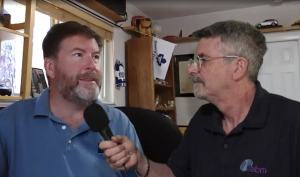Open Services Alliances for Media (OSA) Creates IMF Registration API
Story Highlights
Microservices are cool, however they don’t really have universal interoperability. That is exactly why Chris Lennon, OSA founder and executive director and CEO of MediAnswers recently started the OSA (Open Services Alliances for Media), a global alliance of organizations with the common goal of enabling open, interoperable services across all aspects of the media ecosystem. IABM’s CTO, Stan Moote attends the meetings along with a host of high profile media organizations/vendors and was thrilled to see the quick process within the working groups who just had their first document hand-over to SMPTE, an IMF Registration API. Read on for more information and to check out a quick interview.

Chris Lennon (left) and Stan Moote of IABM discuss the latest developments from OSA.
In the video blog (click here) Chris Lennon, Executive Director of OSA, explains the importance of this project and other projects OSA is working on.
“Work began on this API within the OSA about six months ago,” says Lennon. “A focused project group agreed on an approach and quickly produced a document to SMPTE, who then continued the rapid pace of getting a draft into the hands of implementers. Utilizing SMPTE’s new public Committee Draft (CD) process, the contribution from the OSA underwent a thorough but accelerated review by SMPTE’s Media Microservices Drafting Group, reporting to the 34CS Technology Committee, which is focused on media systems, control, and services. We expect this to be the first of many opportunities for collaboration.”
SMPTE ST 2126 took a similar path from the OSA through SMPTE. The project focused on the fundamental challenge of implementing multivendor, multicloud, microservice-based solutions, which lacked a standardized, common means of reporting back the success (or failure) of their execution. The OSA used input from the IETF and EBU to design a flexible yet standardized framework for status reporting and logging, and contributed the resulting draft to SMPTE, which created the public CD.
Public CDs are open documents that are distributed for review and comment by the professional community for a limited time. The process satisfies several needs, some of which include:
- Orient public CDs toward published business-driven requirements.
- Lightweight and nimble process.
- Allow public comment (not just the SMPTE Standards Community) to encourage wide review (and trial implementation).
- Make easy-to-follow rules – without a cumbersome manual – and provide a checklist of actions.
- Make it easier for trade bodies to work with SMPTE.
“The balance of rigor and speed of the public CD process to push solutions out to implementers is invigorating,” adds Bruce Devlin, SMPTE standards vice president and Mr MXF founder. “I understand this to be the core reason the OSA identified SMPTE and our public CD process for bringing uniformity and interoperability to service-oriented software architecture. Our software-minded colleagues tell me that the public CD process fits well with the agile, iterative way they’re accustomed to working.”
SMPTE is an internationally recognized standards-developing organization with members in more than 64 countries on six continents. SMPTE’s Engineering Documents, including Standards, Recommended Practices, and Engineering Guidelines, are prepared by SMPTE’s Technology Committees. Participation in these Committees is open to all with a bona fide interest in their work. SMPTE cooperates closely with other standards-developing organizations.
OSA is online at www.openservicesalliance.com, and SMPTE is online at SMPTE.org. More information about the organizations’ standards efforts — and how to get involved — is available at smpte.org/standards/about or by email to [email protected] or [email protected].
